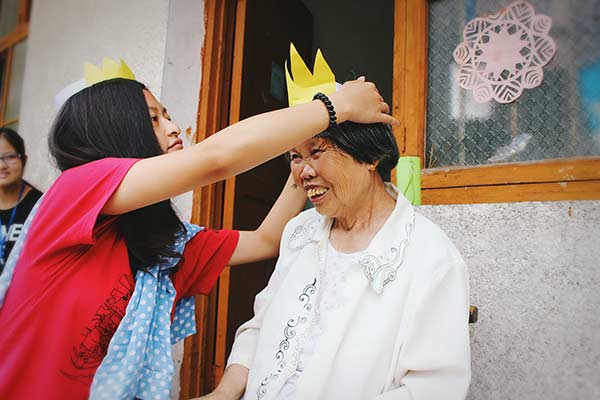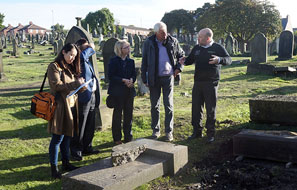Shedding light on life after leprosy
 |
|
Tao Ruqin gives a paper crown to a senior resident at the "leprosy recovery village" in Zhuzhou, Hunan province. [Photo/China Daily] |
Volunteers provide solace to former patients, work to reduce stigma associated with disease
Leprosy, though curable using modern medication, has cast a long shadow over China. Thousands of former patients have been left disfigured by the disease, while enduring social stigma means hundreds still live in colonies, isolated from the rest of society.
Tao Ruqin, a student at the Hunan University of Commerce in Changsha, Hunan province, has spent much of her spare time over the past two years volunteering in these colonies.
She began as a freshman in July 2014, after being inspired by a presentation given by a volunteer association called "Home Working Camp".
The association took her and her fellow volunteers to Longjing Hill in Zhuzhou, Hunan - a designated "leprosy recovery village" that is six hours away from Changsha by train and bus, followed by a 40-minute hike through the mountains.
The village consists of three buildings, housing more than 20 people afflicted with leprosy. They are all age 60 or older and are no longer contagious, yet most live with some sort of disfigurement.
Aside from the nurses who care for them, they have no one else for company.
"I felt like the village was very quiet and lacked vitality. Some of the sufferers, such as those who are paralyzed, rely entirely on the village head," Tao said.
"I was concerned that because we are able-bodied we might upset them, but it turned out that they were actually afraid of scaring us. They would quickly pull their deformed hands away after we shook them, but eventually we became acquainted and any unpleasantness went away."
Working with her fellow volunteers, Tao laid cement to make the village's road less slippery on rainy days. The villagers were thankful, but did not believe her when she said she would return to volunteer again during Spring Festival.
"One grandmother surnamed Zeng was very doubtful, she assumed we were another bunch of college students just looking for life experiences," Tao said.
"She found it hard to believe that anyone would voluntarily spend time with them, because they have suffered so much discrimination and misunderstanding in the past."
Some of the villagers even wept when she spoke with them, overwhelmed at the unfairness of their predicament. "We felt for them and are working with neighboring villages to reduce the stigma associated with the disease," Tao said.
According to the China Leprosy Association, there are about 210,000 people in China who have recovered from leprosy, but nearly half are disabled due to the disease.
New cases are still being reported, though at a rate that is only 2 percent of the peak 60 years ago. Those who contract the disease are no longer sent to colonies and the majority are now treated at home.
"These 'recovery villages' will eventually disappear, but until then we are trying to eliminate the discrimination," said Tao, who has risen through the ranks of the association over the years.
"Volunteering with the association has shown me how little I know about the world. My New Year's resolution is to internalize these experiences - graduation from university certainly won't be the end of my volunteering days."
Contact the writers at liangshuang@chinadaily.com.cn
"These 'recovery villages' will eventually disappear, but until then we are trying to eliminate the discrimination," said Tao, who has risen through the ranks of the association over the years.
"Volunteering with the association has shown me how little I know about the world. My New Year's resolution is to internalize these experiences - graduation from university certainly won't be the end of my volunteering days."
Contact the writers at liangshuang@chinadaily.com.cn
























